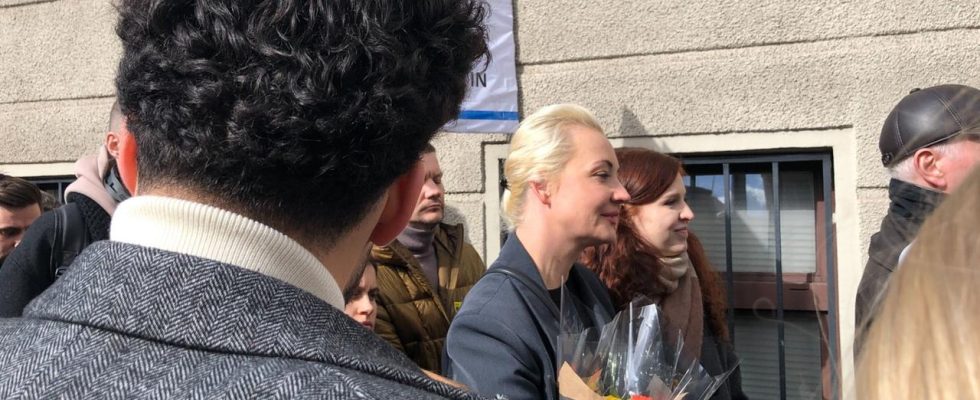Russian citizens can cast their votes for the presidential election in Berlin and Bonn. Today there were long queues in front of the embassy and the consulate general – two prominent Putin opponents also joined the queue.
In the Russian presidential election, numerous Russians also cast their votes at the Consulate General in Bonn and at the Russian Embassy in Berlin. The police estimated the number of people waiting in a queue several hundred meters long in Bonn in the early afternoon at around 1,000.
Due to the high volume of vehicles, there are significant traffic disruptions and temporary closures on the streets around the Consulate General, the police wrote on platform X. Russians living in Germany have been able to cast their votes since 8 a.m. and until 8 p.m.
Two rallies began near the Consulate General in Bonn on Sunday afternoon. According to the police, around 150 people took part in a demonstration under the motto “Lunch against Putin”. The police counted 15 to 20 participants at a pro-Russian rally.
Navalnaya is waiting in front of the embassy in Berlin
ARD–correspondent Demian von Osten reports from the polling station in the Russian embassy in Berlin. People in the long line held up posters with slogans like “Russia without Putin.” There are also prominent Russian opposition figures on site – such as the widow of Kremlin critic Alexei Navalny, Yulia Navalnaya. Russian opposition figure Mikhail Khodorkovsky was also in line.
Navalnaya was greeted with applause and flowers. Navalnaya had called for a protest on the last day of the election, during which Putin critics would come to the polling stations en masse at midday.
Hundreds of people demonstrated against Putin near the embassy. In chants in Russian and German, they called for a Russia without Putin. According to a spokeswoman, the police estimated the number of participants at around 800.
“Control measures” announced
The Russian Consulate General in Bonn had announced increased control measures at polling stations to ensure the safety of voters and members of the electoral commission. Kremlin opponents are calling for the results of the presidential election not to be recognized because democratic standards are not being met.
Independent observers point to fraud and manipulation. Serious Russian opposition members are either not allowed to vote, have fled abroad or are in prison camps. Putin therefore has no real opponents in the election.
Elections in Russia
The presidential election process implemented in Russia between March 15 and 17, in which Vladimir Putin wants to achieve a fifth term in office, does not meet democratic standards. The three candidates admitted alongside Putin, Nikolai Kharitonov (Communist Party), Leonid Slutsky (right-wing populist LDPR) and Vladislav Dawankov (Vice-Chairman of the Duma, candidate of the economically liberal “New People”) are part of the system opposition, real opponents of the Kremlin and the war of aggression against it Ukraine were not accepted as candidates.
Voting will also take place in the occupied territories of Ukraine – under questionable circumstances.
There had hardly been an actual election campaign in advance, but there were reports from independent journalists about pressure on civil servants and employees of state-owned companies to register to vote and to bring at least ten people with them.
There are high hurdles for independent election observers, for example the “Golos” organization was branded as a “foreign agent” several times and disbanded. Those announced from abroad are primarily representatives from states that have strong sympathies for the Russian leadership, such as Serbia, or are themselves governed in an autocratic to dictatorial manner (Venezuela, Myanmar, Cameroon). Three AfD MPs want to travel from Germany as “experts on democracy”.
In previous elections in Russia, there had always been reports and videos of evidence of manipulation of the ballot boxes, multiple voting or incentives such as lavish buffets from the ruling party “United Russia” at polling stations. Protests are quickly stopped by security forces and usually result in criminal prosecution.
Experts therefore speak of a sham election in which the desired result – a victory for Putin and another term as president – is already certain and is simply to be achieved through a show of strength by the state apparatus.
Jasper Steinlein, tagesschau.de

